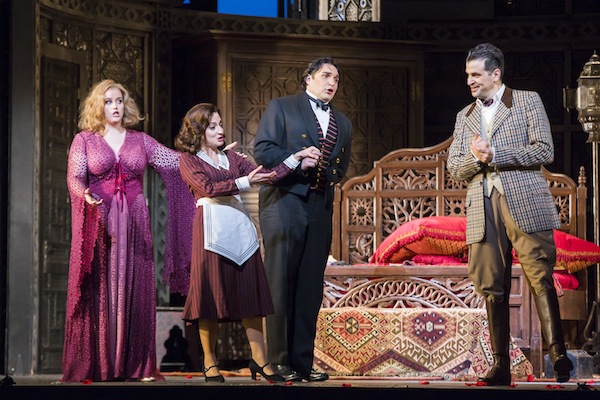Sopranos provide the highlights in Met’s stolid “Figaro” revival

Rachel Willis-Sørensen, Christiane Karg, Adam Plachetka, and Luca Pisaroni in Mozart’s “Le Nozze di Figaro” at the Metropolitan Opera. Photo by Chris Lee
Given the disturbing news coming out of the Metropolitan Opera this week, the mounting of a cherished romantic comedy seemed a little incongruous; but the season must go on.
On Wednesday night the company gave the season premiere of Le Nozze di Figaro, the most exquisite of the Mozart–Da Ponte collaborations. There were moments of brilliance to be found, but the overall feel of the performance was stolid—hardly ideal for what ought to be a nimble, enchanting piece.
Sir Richard Eyre’s bright, agile Edwardian manor staging, first seen in 2014, has plenty of charm, and if its principals are energetic it can be riotously funny. In Wednesday’s tired premiere, most of the comedy was dry, making for a stuffy experience outside of some outstanding musical moments.
It was the two lead sopranos who carried Mozart’s opera on Wednesday. Christiane Karg was superb in her company debut as Susanna; her lively voice showed a hard edge here and there, but was an excellent fit for her feisty portrayal of the chambermaid. As effective as her clear, flowing top was, most impressive was her rich middle voice, faintly smoldering, almost like a chanteuse. Her account of “Deh vieni, non tardar” was more than a little sultry, an unusual and striking interpretation.
Rachel Willis-Sørensen has had several outings as the Countess now, and she seems to grow into the role more with each passing attempt. Her latest incarnation was sublime. Willis-Sørensen’s approach to the character is subtle: she shows no outbursts of anger at the Count’s philandering and abuse, but instead a deep, abiding sadness. That quiet grief was apparent in her vocal performance on Wednesday—there is a shine even to her softest singing, retaining the amber tone and lightly simmering energy that she produces when singing at full voice. “Dove Sono” was masterfully realized, showing frustration in the recitative before giving way to the tearful resignation of the aria. The pianissimo refrain was breathtaking, and transitioned gorgeously into the cabaletta, as proud resolve flowed directly out of her sorrow.
The men, alas, fell flat: as Figaro, Adam Plachetka offered a lean bass-baritone and excellent diction, but had no low notes, and betrayed a grainy tone on most of his held notes. His oddly dark take on the role succeeded only intermittently—his troubled Figaro read brilliantly in the Act IV aria “Aprite un po’ quegli occhi,” showing real pain in a monologue that often comes off as just a glib screed against women. Otherwise, the darkness of his portrayal was hard to square with the character’s essential affability—in “Non piu andrai,” he seemed a downright bully, dragging and pushing Cherubino about the stage.
Luca Pisaroni ought to be an ideal Count Almaviva, with his firm, woody bass-baritone and confident bearing. Dramatically, he was convincing enough as the hot-tempered lothario, but he sounded unusually underpowered vocally on Wednesday. “Vedro mentr’io sospiro,” the booming aria that opens the third act, barely registered, as his struggle to produce volume undercut his dramatic authority.
Serena Malfi’s mezzo showed little color, though her tone was at least consistent. On a night when the humor isn’t landing, Cherubino is a thankless role, and indeed many of Malfi’s scenes felt overworked: the decision to play “Voi che sapete” for laughs, pretending as though she couldn’t remember the lyrics, was especially unfortunate. Her Barbarina, Hyesang Park, made a strong impression, offering a smoky soprano and lively stage presence.
Katarina Leoson was a welcome change of pace from a string of wobbly Marcellinas, her voice dark, rich and secure. Maurizio Muraro, as ever, showed a lavish fullness of sound, though his delivery was most convincing in his recitativess and ensemble scenes; the comic patter of “La vendetta” was oddly flat. Robert McPherson brought a reedy tenor as the smarmy Don Basilio.
The Met Chorus was in fine voice on Wednesday, as was the orchestra—that was the strength of Harry Bicket’s conducting. When accompanying slow, reflective arias, he spun pure silk out of the pit. The rest tended to drag, especially in the ensemble numbers, where sleepy articulation drained life out of the music.
Le Nozze di Figaro runs through January 19 at the Metropolitan Opera. A second cast, starring Ailyn Pérez as Countess Almaviva, Nadine Sierra as Susanna, Ildar Abdrazakov as Figaro, Mariusz Kwiecien as Count Almaviva, and Isabel Leonard as Cherubino, opens on December 29. metopera.org
Posted Dec 08, 2017 at 3:26 pm by Jean S Sanders
Christiane Karg was definitely the star. I hope there will be opportunities to hear her sing again soon.
The lighting and the dreary stage setting gave the production an over all somber and gloomy feel.
Posted Dec 09, 2017 at 9:50 pm by Suzanne Torrey
It’s unfair to blame the singers for characterizations or portrayals on stage since what they do comes from the director. In this case, the Met brought in a new guy to rehearse this cast.
Also, the set for this production is ponderous and “sucks up” sound. It’s dark and not well designed from a performer’s standpoint and some of the singers really dislike it.
Posted Dec 10, 2017 at 2:13 am by Chris Quimby
The women rule this cast. They’re in tune and dramatically on their way to becoming better at portraying the more serious, pervasive themes of marriages. The men were in tune with good timbre, but lacked vocal interest. The guys were just …boring. The orchestra finally got its rhythmic act together well into the first act and its sonic balance together in the second. A few moments in the second act were brilliant with singers and orchestra finally balanced in volume. I wish Luca had some guts and that Adam would spend energy in the convincing that drives the story.